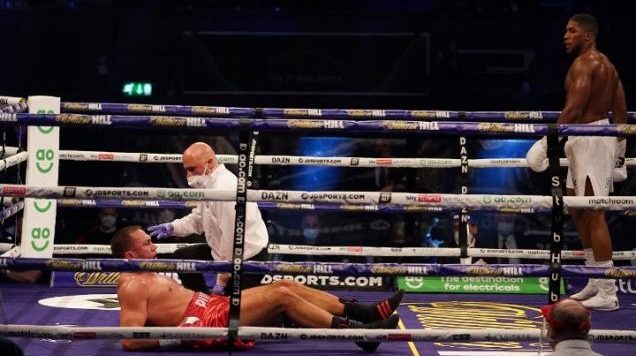When you’re lost, a step back backward is often the first step in the right direction. You take your time until your surroundings look and feel familiar. That familiarity is what allows us to turn down all the noise in our brains generated by having to constantly absorb alien information while also thinking about our next steps. For many of us, that’s largely the appeal of going home for the holidays. Our hometowns and families are predictable. Nothing is coming at you from unexpected directions, and you can either put all your energy into solving individual problems, or just coast.
For Anthony Joshua (24-1, 22 KO), 2019 was a year of steps into alien territory. His first fights outside the UK came against Andy Ruiz and resulted in him getting stopped at Madison Square Garden in June before climbing on his bike and hunting and pecking his way to a unanimous decision in the rematch. It wasn’t just the locations that were new. Joshua was forced to deal with angles, inside fighting, and the unsteadiness of his own chin. That he came back to win the rematch and reclaim his belts didn’t matter quite as much as how he did it. We were suddenly left to wonder if we’d seen the last of Joshua in destroyer mode. The prospect of watching another physically dominant heavyweight jab, circle, and clench his way to one-sided victories did not appeal to anyone.
Lucky then for Joshua that his most recent bout was a homecoming of sorts. The fight — contested at Wembley Arena and televised on DAZN last Saturday — went as predictably as Christmas dinner conversation. Kubrat Pulev (28-2, 14 KO) is 39 years old, has hung around the heavyweight top 10 for most of the last decade, and got stopped by the only elite heavyweight he’s ever faced (the obliquely referenced Wladimir Klitschko). He was also a mandatory for one of the alphabet gangs, so everything made perfect sense. Pulev isn’t just a European heavyweight, he’s every European heavyweight. He’s better than most, but his entire offensive arsenal as a fighter consists of a good 1-2 and clinching when close. He’s going to move around on an imaginary cartesian plane in the ring using only cardinal directions. Head movement isn’t happening, but he might give you the idea it happened by bobbing between levels and occasionally changing the placement of his gloves.
If you’re Joshua, this is crushing your Uncle at chess after Christmas dinner because he started drinking at 8 am. He’s been doing this his entire career, and everything about him as a fighter is perfectly tuned for that opponent. And that’s exactly what happened. Pulev put up something of a fight, but Joshua is bigger, stronger, faster, and just plain better.
If you were looking for evidence of how Joshua has dealt with his loss to Ruiz and what that means going forward, you were out of luck. We saw nothing from Joshua that we hadn’t seen during his first 22 professional bouts. He worked smartly behind his jab, moved efficiently though not gracefully, and when Pulev made mistakes, Joshua punished him with power shots. Like Pulev, Joshua moves around in straight lines. If he’s attacking, he steps straight forward, if defending, he hops straight back. At that point, he resets and we start all over again.
If that seems faint praise for a spectacular knockout victory, well, it is. The KO was spectacular, but the victory was not. The right cross that hurt Pulev in the 3rd was brutal, and the follow-up attack that caused him to turn his back (yes, technically that should’ve been a stoppage) really did have you thinking the fight would be over soon. It wasn’t. Joshua smothered much of his own work after hurting Pulev, and then returned to his measured pace in the 4th. That lasted until the 9th, when a string of uppercuts dumped Pulev on his ass again, this time in dire straights. Joshua did exactly was he was supposed to do and detonated a right cross that convinced Pulev’s brain and body they were done for the evening.
The path for heavyweight supremacy still lies ahead of Joshua, though, in the form of Tyson Fury. At this point, there’s no reason to suspect that Joshua won’t face Fury next. It will fill any stadium in Britain, and likely plenty of other places. I guarantee it will make everyone involved a metric fuck ton of money. What I won’t guarantee is anything about the fight itself, and neither should anyone else. Fury looked like destruction made sentient battering Deontay Wilder into a heap last February, but that’s a one-off performance. The reason it was so shocking isn’t that we were ignorant of Wilder’s myriad technical flaws, but Fury had never fought so aggressively.
We are left then, with a series of questions unanswered and a slew of new ones to ponder. We won’t have any way to answer them until that fight begins, so they’re best left off the table until the first bell rings.
(Photo by Mark Robinson)

